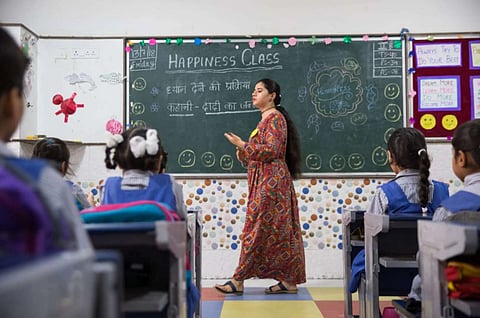
Mumbai- The Maharashtra government has recently introduced a new dress code for school teachers. The new dress code will prohibit the wearing of t-shirts, jeans, or any other shirt with designs or pictures on it.
The new dress code also requires female teachers to wear a saree or salwar suit, while male teachers must wear trousers and a shirt tucked inside. The Maharashtra government has also given the right to choose the dress code for the school teachers. The preference for light-colored shirts and dark trousers has been given to the teachers.
In a recent government resolution (GR) issued by the School Education Department, schools are instructed to determine the dress code for male and female teachers. Additionally, teachers are now permitted to use the prefix 'Tr' before their names, akin to doctors and advocates.
This dress code directive applies to all schools across the state, including private, aided, and non-aided institutions.
The GR emphasizes the importance of neat attire for teachers. Female teachers are advised to wear sarees or dresses such as salwar, chudidar, kurta, and dupatta, while male teachers are encouraged to wear trousers and shirts (tucked in).
Schools are given the flexibility to choose the color scheme for the dress code, with a suggestion that male teachers wear light-colored shirts and dark-colored trousers. Notably, the GR prohibits teachers from wearing t-shirts, jeans, or any attire with designs or pictures.
This comprehensive guideline, comprising nine points, applies universally to all schools, regardless of their public or private status or affiliation with educational boards.
However, the implementation of this dress code has sparked criticism from teachers and educationists. Some question the necessity and intent behind such regulations, arguing that teachers are already mindful of dressing appropriately, and schools typically exercise discretion in enforcing dress norms. They argue that dress codes should remain within the purview of individual schools and teachers, as they are better equipped to assess and address their unique contextual requirements.
The Mooknayak interviewed teachers from various parts of the country and received diverse opinions on the government resolution (GR). Sher Singh, President of Panchayati Raj Shikshak Sangh Rajasthan, believes that while dressing is a personal choice, teachers hold a revered position in society and should dress decently in accordance with their role.
On the other hand, Shalini Sood, a teacher at Vidyangan, expresses her preference for both Indian and Western attire but acknowledges the importance of wearing sarees and suits for school as they provide comfort.
Shobha Pillai, a senior teacher in Kerala's Kollam district, emphasizes that school teachers have a responsibility to instill morals and values, suggesting that wearing jeans or skirts to school may conflict with this responsibility, even if individuals have the freedom to do so outside of school.
On the contrary, some teachers hold the view that dressing is entirely a personal matter, and the state should not impose its directives. Shveta Singh, a visiting faculty at MLSU, Udaipur, expresses this sentiment, stating that individuals know how to dress appropriately for schools and classrooms. She personally wears long skirts and kurtas over a pair of jeans, emphasizing that as long as the attire is not vulgar or indecent, there should be no issue with it.
Last year in May, the Assam government passed a similar directive addressing the attire of teachers in educational institutions. Narayan Konwar, Secretary to the Government Assam Department of School Education, had highlighted the importance of teachers being exemplary in decency while performing their duties and had emphasized the need for a dress code that reflects decorum, professionalism, and seriousness of purpose.
The order had specified the dress code for both male and female teachers. Male teachers were required to wear appropriate formal attire, such as formal shirts and pants, and were prohibited from wearing casual attire like t-shirts and jeans.
Female teachers were instructed to wear decent attire, including salwar suits, sarees, or mekhela chadors, and were also barred from wearing casual items such as t-shirts, jeans, or leggings. Additionally, both male and female teachers were advised to choose clean, modest, and sober-colored clothes, avoiding flashy or party apparel.
You can also join our WhatsApp group to get premium and selected news of The Mooknayak on WhatsApp. Click here to join the WhatsApp group.